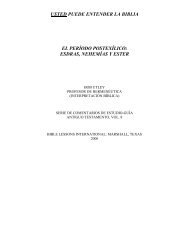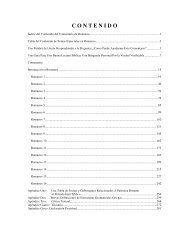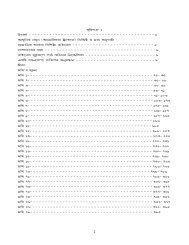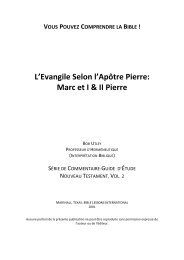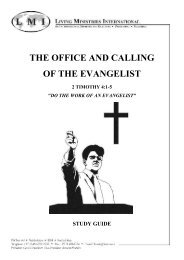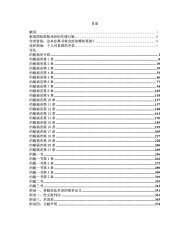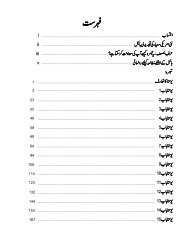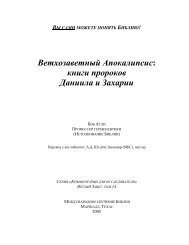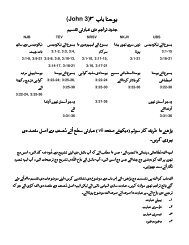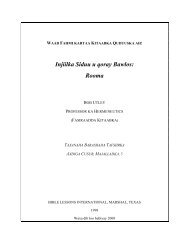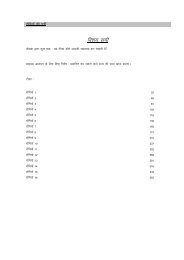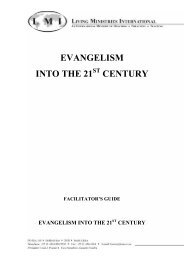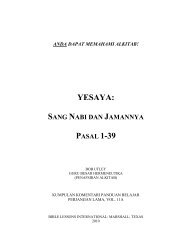- Page 1 and 2:
YOU CAN UNDERSTAND THE BIBLEISAIAH:
- Page 3 and 4:
Isaiah 26 .........................
- Page 5 and 6:
Elder, II John 1 ..................
- Page 7 and 8:
The Hebrew text used is Biblia Hebr
- Page 9 and 10:
II.Aspects of PredicationA. VERBSTh
- Page 11 and 12:
should clearly grasp, not so much t
- Page 13 and 14:
c. something which is possible or e
- Page 15 and 16:
NIVNJBNRSVOTPGREBRSVNew Internation
- Page 17 and 18:
A. The New King James Version (NKJV
- Page 19 and 20:
B. I believe the Bible was written
- Page 21 and 22:
. contemporary word usagec. genre3.
- Page 23 and 24:
In applying the Bible, it is import
- Page 25 and 26:
4. ambiguous textsAlthough the Engl
- Page 27 and 28:
2. by chronology3. by events which
- Page 29 and 30:
(3) Israel as(a) wife, 50:1(b) serv
- Page 32 and 33:
a. Hezekiah fully participated in t
- Page 34 and 35:
IX.MAIN TRUTHSA. Isaiah held Judah
- Page 36 and 37:
1:27-31(27-31) (27-31) (27-31)1:27-
- Page 38 and 39:
c. El-Shaddai (“God Almighty” o
- Page 40 and 41:
c. from a Ugaritic (Canaanite) root
- Page 42 and 43:
SPECIAL TOPIC: BOB’S EVANGELICAL
- Page 44 and 45:
incapable of appropriate action (cf
- Page 46 and 47:
Here is a good quote to conclude th
- Page 48 and 49:
} “whole head. . .whole heart”
- Page 50 and 51:
SPECIAL TOPIC: THE REMNANT, THREE S
- Page 52 and 53:
2. other sexual sins, Lev. 18:26,27
- Page 54 and 55:
(4) redemption(5) glorification(6)
- Page 56 and 57:
3. the covenant with Abraham (cf. G
- Page 58 and 59:
3. Asis - This is obviously alcohol
- Page 60 and 61:
NASB (UPDATED) TEXT: 1:24-2624There
- Page 62 and 63:
SPECIAL TOPIC: FIREFire has both po
- Page 64 and 65:
ISAIAH 2PARAGRAPH DIVISIONS OF MODE
- Page 66 and 67:
C. The resultant Judgment of YHWH,
- Page 68 and 69:
Zaphon in the far north (cf. Isa. 1
- Page 70 and 71:
The world mission of gospel proclam
- Page 72 and 73:
Lord.” I have come face to face w
- Page 74 and 75:
and make it “traders.” It seems
- Page 76 and 77:
21In order to go into the caverns o
- Page 78 and 79:
ISAIAH 3PARAGRAPH DIVISIONS OF MODE
- Page 80 and 81:
Woe to them!For they have brought e
- Page 82 and 83:
3:4 Judah’s elder leadership will
- Page 84 and 85:
These phrases could be1. literala.
- Page 86 and 87:
3:17NASB, NJB,REB “make their for
- Page 88 and 89:
ISAIAH 4PARAGRAPH DIVISIONS OF MODE
- Page 90 and 91:
} “the Branch of the LORD” To d
- Page 92 and 93:
SPECIAL TOPIC: THE TWO BOOKS OF GOD
- Page 94 and 95:
ISAIAH 5PARAGRAPH DIVISIONS OF MODE
- Page 96 and 97:
BRIEF OUTLINEA. The Parabolic Song,
- Page 98 and 99:
6I will lay it waste;It will not be
- Page 100 and 101:
SPECIAL TOPIC: ANCIENT NEAR EASTERN
- Page 102 and 103:
them spiritual ears and eyes (cf. D
- Page 104 and 105:
2. Jeremiah changed it from a place
- Page 106 and 107:
5:17 “Then the lambs will graze a
- Page 108 and 109:
So their root will become like rot
- Page 110 and 111:
The term “nations” in the Masor
- Page 112 and 113:
CONTEXTUAL INSIGHTSA. There has alw
- Page 114 and 115:
II.9. human form - Exod. 24:9-11; P
- Page 116 and 117:
SPECIAL TOPIC: HOLYI. Old Testament
- Page 118 and 119:
12The LORD has removed men far away
- Page 120 and 121:
} “Send me” The VERB “send”
- Page 122 and 123:
} “Whose stump remains when it is
- Page 124 and 125:
3. Third paragraph4. Etc.BACKGROUND
- Page 126 and 127:
} “Shear-jashub” This is Isaiah
- Page 128 and 129:
} “from the LORD your God” It i
- Page 130 and 131:
7:18 “In that day” “That day
- Page 132 and 133:
ISAIAH 8PARAGRAPH DIVISIONS OF MODE
- Page 134 and 135:
8:1 “Take for yourself a large ta
- Page 136 and 137:
4. Huldah was a prophetess whom Kin
- Page 138 and 139:
Even the king of Assyria and all hi
- Page 140 and 141:
55:8-11; Ps. 33:11). God needs nor
- Page 142 and 143:
III.C. Paul uses the concept of a
- Page 144 and 145:
The second NOUN, “spiritists” (
- Page 146 and 147:
Read the chapter in one sitting. Id
- Page 148 and 149:
Because of the desert between Mesop
- Page 150 and 151:
NASB (UPDATED) TEXT: 9:8-128The Lor
- Page 152 and 153:
19By the fury of the LORD of hosts
- Page 154 and 155:
following the original author’s i
- Page 156 and 157:
10:6 “a godless nation. . .the pe
- Page 158 and 159:
Or like a rod lifting him who is no
- Page 160 and 161:
27So it will be in that day, that h
- Page 162 and 163:
10:33 The second half of this verse
- Page 164 and 165:
2. Second paragraph3. Third paragra
- Page 166 and 167:
a. counsel, BDB 420b. strength, BDB
- Page 168 and 169:
The fatling would have sacrificial
- Page 170 and 171:
(2) Mark 10:41(3) Luke 14:31; 15:8;
- Page 172 and 173:
ISAIAH 12PARAGRAPH DIVISIONS OF MOD
- Page 174 and 175:
} “although You were angry with m
- Page 176 and 177:
ISAIAH 13PARAGRAPH DIVISIONS OF MOD
- Page 178 and 179:
WORD AND PHRASE STUDYNASB (UPDATED)
- Page 180 and 181:
13:2 This describes the gathering o
- Page 182 and 183:
6. little ones dashed to pieces in
- Page 184 and 185:
ISAIAH 14PARAGRAPH DIVISIONS OF MOD
- Page 186 and 187:
2. The concept of a personal archen
- Page 188 and 189:
} “Jacob. . .Israel” These two
- Page 190 and 191:
happened, and just as I have planne
- Page 192 and 193:
14:12 “How you have fallen from h
- Page 194 and 195:
Loss of descendants was seen as a g
- Page 196 and 197:
DISCUSSION QUESTIONSThis is a study
- Page 198 and 199:
CONTEXTUAL INSIGHTSLocations Mentio
- Page 200 and 201:
15:2 “Dibon. . .Nebo. . .Medeba
- Page 202 and 203:
ISAIAH 16PARAGRAPH DIVISIONS OF MOD
- Page 204 and 205:
16:2 Moab is described as1. fleeing
- Page 206 and 207:
12So it will come about when Moab p
- Page 208 and 209:
ISAIAH 17PARAGRAPH DIVISIONS OF MOD
- Page 210 and 211:
} “the remnant of Syria” This p
- Page 212 and 213:
SPECIAL TOPIC: FERTILITY WORSHIP OF
- Page 214 and 215:
NASB (UPDATED) TEXT: 17:12-1412Alas
- Page 216 and 217:
3All you inhabitants of the world a
- Page 218 and 219:
However, this context could be unde
- Page 220 and 221:
ISAIAH 19PARAGRAPH DIVISIONS OF MOD
- Page 222 and 223:
In this text the people claimed to
- Page 224 and 225:
7. purified the water at Marah, Exo
- Page 226 and 227:
NASB (UPDATED) TEXT: 19:16-1716In t
- Page 228 and 229:
} “a Savior and a Champion” In
- Page 230 and 231:
ISAIAH 20PARAGRAPH DIVISIONS OF MOD
- Page 232 and 233:
6. sparing Jerusalem from Assyria,
- Page 234 and 235:
3. Third paragraph4. Etc.CONTEXTUAL
- Page 236 and 237:
21:3-4 The prophet describes the ef
- Page 238 and 239:
NASB (UPDATED) TEXT: 21:11-1211The
- Page 240 and 241:
ISAIAH 22PARAGRAPH DIVISIONS OF MOD
- Page 242 and 243:
ased on certain word plays or key w
- Page 244 and 245:
This same area may have been filled
- Page 246 and 247:
22:15-19 This describes YHWH’s ju
- Page 248 and 249:
1. Gen. 15:6 - Abram’s personal e
- Page 250 and 251:
2. load will be cut down (BDB 154,
- Page 252 and 253:
CONTEXTUAL INSIGHTSA. This condemna
- Page 254 and 255:
2. the palace, temple, and fortress
- Page 256 and 257:
23:10 The rival maritime empire of
- Page 258 and 259:
23:17-18 The riches of Phoenicia wi
- Page 260 and 261:
BACKGROUND STUDYA. Isaiah 24-27 for
- Page 262 and 263:
6. completely despoiled, v. 3, BDB
- Page 264 and 265:
Peshitta “shall be destroyed”LX
- Page 266 and 267:
} “As the shaking of an olive tre
- Page 268 and 269:
angels who have aided in either the
- Page 270 and 271:
ISAIAH 25PARAGRAPH DIVISIONS OF MOD
- Page 272 and 273:
4. You have made a city into a heap
- Page 274 and 275:
}NASBNKJV, PeshittaNRSVTEV, NJBREB
- Page 276 and 277:
25:9 “in that day” This refers
- Page 278 and 279:
ISAIAH 26PARAGRAPH DIVISIONS OF MOD
- Page 280 and 281:
WORD AND PHRASE STUDYNASB (UPDATED)
- Page 282 and 283:
6. “spread out,” BDB 831, KB 97
- Page 284 and 285:
VIII. “His words”A. BDB 202 - D
- Page 286 and 287:
NJB, REB “we invoke your name”L
- Page 288 and 289:
NASB (UPDATED) TEXT: 26:20-2120Come
- Page 290 and 291:
CONTEXTUAL INSIGHTSA. This is the c
- Page 292 and 293:
27:4-5 There are several COHORTATIV
- Page 294 and 295:
} “by driving them away” The He
- Page 296 and 297:
DISCUSSION QUESTIONSThis is a study
- Page 298 and 299:
following the original author’s i
- Page 300 and 301:
Notice how the LORD’S agent is ch
- Page 302 and 303:
For morning after morning it will p
- Page 304 and 305:
28:16 This verse is a shocking chan
- Page 306 and 307:
29This also comes from the LORD of
- Page 308 and 309:
CONTEXTUAL INSIGHTSA. The Jewish St
- Page 310 and 311:
Thus the multitude of all the natio
- Page 312 and 313:
This was accomplished by1. blob of
- Page 314 and 315:
NASB (UPDATED) TEXT: 29:22-2422Ther
- Page 316 and 317:
. LutroÇ, “to release”(1) to r
- Page 318 and 319:
ISAIAH 30PARAGRAPH DIVISIONS OF MOD
- Page 320 and 321:
} “rebellious children” This ti
- Page 322 and 323:
Prophesy illusions.11Get out of the
- Page 324 and 325:
. see not, BDB 906, KB 1157, negate
- Page 326 and 327:
NASB (UPDATED) TEXT: 30:1818Therefo
- Page 328 and 329:
2. good crops, v. 23a. rich (BDB 20
- Page 330 and 331:
JB“will be battered”LXX, Peshit
- Page 332 and 333:
B. The Anchor Bible has an interest
- Page 334 and 335:
} “the LORD of hosts come down”
- Page 336 and 337:
} “whose fire. . .furnace” This
- Page 338 and 339:
CONTEXTUAL INSIGHTSA. Chapters 31-3
- Page 340 and 341:
12Beat your breasts for the pleasan
- Page 342 and 343: NJB “Ophel” (BDB 779), a sectio
- Page 344 and 345: l. eternity everlasting(1) I Kgs. 8
- Page 346 and 347: all people are honored and treated
- Page 348 and 349: ISAIAH 33PARAGRAPH DIVISIONS OF MOD
- Page 350 and 351: WORD AND PHRASE STUDYNASB (UPDATED)
- Page 352 and 353: } “locusts” Locust invasions we
- Page 354 and 355: 33:13 “You who are far away. . .y
- Page 356 and 357: 3. or bothIn v. 17, both “your ey
- Page 358 and 359: B. Because there is a double space
- Page 360 and 361: 34:4 This hyperbolic language relat
- Page 362 and 363: NKJV “night creature”NRSV, NJB
- Page 364 and 365: 1. seek, BDB 205, KB 233, Qal IMPER
- Page 366 and 367: WORD AND PHRASE STUDYNASB (UPDATED)
- Page 368 and 369: . fear not, BDB 431, KB 432, Qal IM
- Page 370 and 371: ISAIAH 36PARAGRAPH DIVISIONS OF MOD
- Page 372 and 373: 36:2 “And the king of Assyria sen
- Page 374 and 375: 36:7 “whose high places and whose
- Page 376 and 377: 2. Arpad was a city in northern Syr
- Page 378 and 379: 1. First paragraph2. Second paragra
- Page 380 and 381: } “I will make him fall by the sw
- Page 382 and 383: 37:19 The truth of v. 18 is seen to
- Page 384 and 385: II.3. Model Prayer, Matt. 6:5-13; L
- Page 386 and 387: C. Other aspects1. Perseverancea. L
- Page 388 and 389: translation. The term can have eith
- Page 390 and 391: ISAIAH 38PARAGRAPH DIVISIONS OF MOD
- Page 394 and 395: } “LORD. . .LORD” The MT has Ya
- Page 396 and 397: The MT has the VERB “loved” (8-
- Page 398 and 399: ISAIAH 39PARAGRAPH DIVISIONS OF MOD
- Page 400 and 401: Also note that the Babylon of Hezek
- Page 402 and 403: B. A. Briggs in his book, General I
- Page 404 and 405: APPENDIX TWOINTRODUCTION TO OLD TES
- Page 406 and 407: E. Prophets represent God to the pe
- Page 408 and 409: APPENDIX THREEA BRIEF HISTORICAL SU
- Page 410 and 411: Haran. He engaged the Babylonian fo
- Page 412 and 413: n. 1340-1310 Haremhab3. 19th Dynast
- Page 414 and 415: APPENDIX FOURCHARTSOLD TESTAMENT TI
- Page 416 and 417: KINGS AND EVENTS OF THE BABYLONIAN,
- Page 418 and 419: GREECE359 - 336 Philip II of Macedo
- Page 420 and 421: GREEK359 - 336 Philip II of Macedon
- Page 422 and 423: JUDAH’S KINGS (I CHR. 3:1-16; MAT
- Page 424: APPENDIX FIVE - DOCTRINAL STATEMENT



